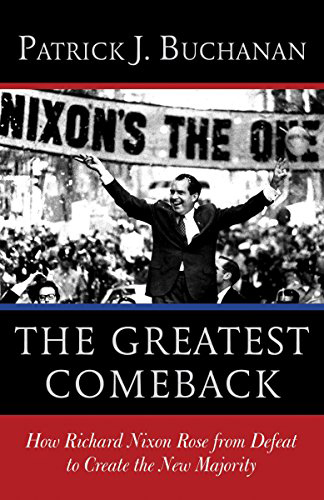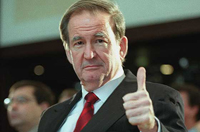Balance Sheet of the Forever War
Patrick J. Buchanan
 “It is time for this war in Afghanistan to end,” said Gen. John Nicholson in Kabul on his retirement Sunday after a fourth tour of duty and 31 months as commander of U.S. and NATO forces. “It is time for this war in Afghanistan to end,” said Gen. John Nicholson in Kabul on his retirement Sunday after a fourth tour of duty and 31 months as commander of U.S. and NATO forces.
Labor Day brought news that another U.S. serviceman had been killed in an insider attack by an Afghan soldier.
Why do we continue to fight in Afghanistan?
“We continue to fight simply because we are there,” said retired Gen. Karl Eikenberry who preceded Gen. Nicholson.
“Absent political guidance and a diplomatic strategy,” Eikenberry told The New York Times, “military commanders have filled the vacuum by waging a war all agree cannot be won militarily.”
This longest war in U.S. history has become another no-win war.
Yet, if the 14,000 U.S. troops in Afghanistan were pulled out, the regime would fall, the Taliban would take over, and the massacres would begin.
So America stays in and soldiers on. For how long?

The 17th anniversary of 9/11, now imminent, appears a proper time to take inventory of our successes and failures in the forever wars of the Middle East into which America was plunged in this new century.
In Afghanistan, the Taliban presence is more pervasive in more provinces than at any time since the regime was overthrown in 2001.
In the seven-year Syrian civil war we helped to ignite by arming rebels to overthrow President Assad, the conflict appears headed for its largest, bloodiest and most decisive battle.
The Syrian army, backed by Russia and Iran, is preparing to attack Idlib province. Three million people live there and 70,000 rebels are encamped, including 10,000 al-Qaida fighters.
In a Monday tweet, President Donald Trump warned Syria against attacking Idlib, and warned Iran and Russia against joining any such attack: “The Russians and Iranians would be making a grave humanitarian mistake to take part in this potential human tragedy. Hundreds of thousands of people could be killed.” America and Russia both have warships in the Eastern Med.
National Security Adviser John Bolton has warned that Syria’s use of gas in Idlib would trigger a U.S. military response. This is an invitation for the rebels in Idlib to conduct a false-flag gas attack to lure U.S. air power to their side.
 Monday in Damascus, the Iranian foreign minister said the time had come to eradicate the terrorist enclave in Idlib. If the Syrians, Russians and Iranians are not bluffing, and the U.S. warnings are serious, we may be headed for a U.S.-Russia clash inside Syria. Monday in Damascus, the Iranian foreign minister said the time had come to eradicate the terrorist enclave in Idlib. If the Syrians, Russians and Iranians are not bluffing, and the U.S. warnings are serious, we may be headed for a U.S.-Russia clash inside Syria.
Yet, again, what vital interest of ours is imperiled in Idlib province?
On Monday, Saudi Arabia admitted to having made a mistake when, using a U.S.-made fighter-bomber, a school bus was attacked on Aug. 9, killing dozens of Yemeni children in that humanitarian horror of a war.
The Saudi campaign to crush the Houthi rebels and return the previous regime to power in Sanaa could never succeed were it not for U.S.-provided planes, missiles, bombs and air-to-air refueling.
We are thus morally responsible for what is happening.
In Libya, where we overthrew Moammar Gadhafi, rival factions now control Benghazi in the east and Tripoli in the west. August saw fighting break out in the capital, threatening the U.N.-backed unity government there.
In Iraq, which we invaded in 2003 to strip of weapons of mass destruction it did not have, and to bring the blessings of democracy to Mesopotamia, rival factions are struggling for power after recent elections saw pro-Iranian and anti-American forces gain ground.
Meanwhile, the Iranian currency is sinking as a November deadline approaches for Europe to choose between cutting ties to Iran or losing U.S. markets. While the Tehran regime has threatened to close the Strait of Hormuz if its oil is denied access to world markets, it faces economic strangulation if it does not submit to U.S. demands.

When one adds up the U.S. dead and wounded from the wars we have launched since 2001 with the Arab and Muslim wounded, killed, orphaned, widowed, uprooted and turned into refugees, as well as the trillions of dollars lost, what benefits are there on the other side of the ledger?
Now we appear to be moving to confront Russia in Ukraine.
In an interview with The Guardian last week, U.S. special envoy to Ukraine Kurt Volker said Washington is ready to build up Ukraine’s naval and air defense forces, given Russia’s continued support for separatists in the Donbass. The administration is “absolutely” prepared to supply new lethal weaponry, beyond the Javelin anti-tank missiles delivered in April.
But if a Ukrainian army moves against pro-Russian rebels in Luhansk and Donetsk, and Russia intervenes on the side of the rebels, are we really prepared to come to the aid of the Ukrainian army?
President Trump has yet to withdraw us from any of the wars he inherited, but he has kept us out of any new wars — a record worth preserving.
 Patrick Buchanan has been a senior advisor to three Presidents, twice a candidate for the Republican presidential nomination, and the nominee of the Reform Party in 2000. Patrick Buchanan has been a senior advisor to three Presidents, twice a candidate for the Republican presidential nomination, and the nominee of the Reform Party in 2000.
Born in Washington, D.C., Mr. Buchanan was educated at Gonzaga High School where he was graduated first in his class in 1956. He attended Georgetown on a full academic scholarship, and was graduated with honors in English and Philosophy in 1961, and inducted into the university’s Gold Key Society. He received a masters degree from the Graduate School of Journalism at Columbia in 1962. At 23, he became the youngest editorial writer on a major newspaper in America: The St. Louis Globe-Democrat.
After arranging a meeting with former Vice President Richard Nixon in December of 1965, Mr. Buchanan became the first full-time staffer in his legendary comeback. He traveled with the future President in the campaigns of 1966 and 1968, and to the Middle East, Africa and Israel in the immediate aftermath of the Six Day War. From January of 1969 to August of 1974, he was a Special Assistant to President Nixon, worked with the President on the Cambodian invasion speech, and with Vice President Agnew on many of his speeches on the media and student disorders. Mr. Buchanan was a member of the official US delegation to the Peoples Republic of China in 1972, and attended the Moscow-Yalta-Minsk summit of 1974. After President Nixon’s resignation, Mr. Buchanan served President Ford until October of 1974.
After leaving the White House, Mr. Buchanan became a nationally syndicated columnist, and in May of 1982 began as a panelist on NBC’s “The McLaughlin Group” and a co-host of CNN’s new show “Crossfire.”
In 1985, Mr. Buchanan returned to the White House as Director of Communications. He accompanied President Reagan to his Geneva summit with Mikhail Gorbachev and was with President Reagan in Hofde House at Reykjavik which has been described as the decisive summit of the Cold War. On leaving the White House in 1987, Mr. Buchanan returned to journalism, his syndicated column, and to “The McLaughlin Group,” “Crossfire,” and began hosting a new show, “Capital Gang” on CNN.
In December 1991, Mr. Buchanan challenged President George H. W. Bush for the Republican nomination and almost upset the President in New Hampshire, winning 3 million votes in the GOP primaries. In August 1992, Mr. Buchanan opened the Republican convention in Houston with his speech on the “culture war” which is now ranked among the most controversial in convention history. In 1996, he ran a second time for the GOP nomination, won the New Hampshire primary, and finished second to Sen. Dole, again, with three million Republican votes.
After winning the nomination of the Reform Party in 2000, Mr. Buchanan retired from politics and became again an author, columnist, and a commentator on MSNBC for almost a decade.
Mr. Buchanan has written 12 books, including seven straight New York Times bestsellers: A Republic, Not an Empire; The Death of the West; Where the Right Went Wrong, State of Emergency, Day of Reckoning, Churchill, Hitler and The Unnecessary War, and Suicide of a Superpower.
Mr. Buchanan is currently an author, columnist, chairman of The American Cause foundation, and an editor of The American Conservative. He is married to the former Shelley Ann Scarney, who was a member of the Richard Nixon’s vice presidential staff from 1959-61, and a member of the White House Staff from 1969 to 1975.
buchanan.org
| 



